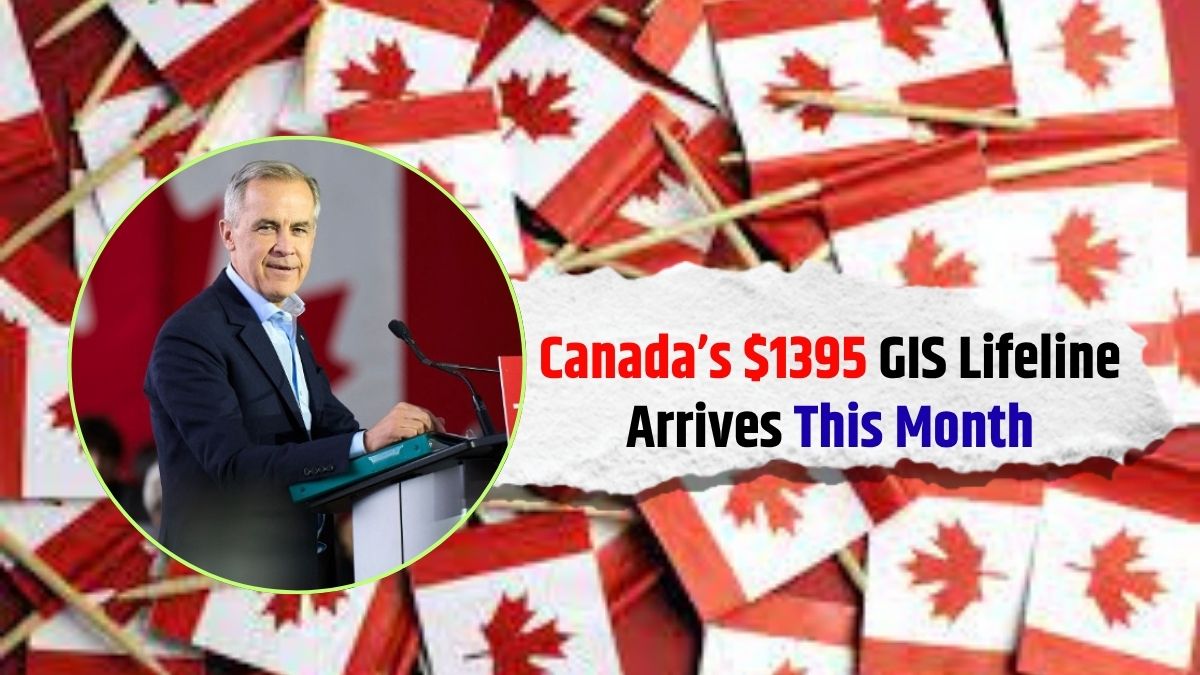A significant relief is on the way for thousands of low-income seniors across Canada. The federal government has confirmed a \$1,395.73 Guaranteed Income Supplement (GIS) payment, scheduled to be deposited on July 29, 2025. This vital financial aid, overseen by the Canada Revenue Agency (CRA), aims to help older adults manage rising living expenses and maintain dignity in retirement.
Let’s break down who is eligible, what this benefit entails, and how seniors can ensure they receive it without delays.
What Is the GIS and Why Is It Important?
The Guaranteed Income Supplement (GIS) is a non-taxable monthly benefit designed to supplement the income of Canada’s most financially vulnerable seniors. Provided alongside the Old Age Security (OAS) pension, this payment targets seniors aged 60–64 and surviving spouses who fall below a specific annual income threshold.
The GIS ensures that eligible seniors can afford basic necessities like housing, groceries, transportation, and healthcare. It’s indexed to inflation and adjusted quarterly to reflect the Consumer Price Index (CPI), keeping pace with the rising cost of living.
Key Details of the GIS July 2025 Payment
Here’s a quick summary of what eligible seniors can expect this month:
| Feature | Details |
|---|---|
| Payment Amount | \$1,395.73 |
| Payment Date | July 29, 2025 |
| Program | Guaranteed Income Supplement |
| Administered by | Canada Revenue Agency (CRA) |
| Eligibility | Low-income OAS recipients |
| Income Limit | \$41,184 (combined annual income) |
This \$1,395.73 payment is not taxable, and it offers critical support for seniors with little to no savings or private pensions.
Who Qualifies for the \$1,395 GIS Payment in July 2025?
To receive the GIS payment in July 2025, applicants must meet all of the following criteria:
- Be currently receiving Old Age Security (OAS)
- Be between 60 and 64 years old
- Be a Canadian citizen or legal resident
- Have lived in Canada for at least 10 years after turning 18
- Be the surviving spouse or common-law partner of an OAS recipient
- Have a combined annual income under \$41,184
This targeted approach ensures that the payment goes directly to seniors who need it most.
Complete GIS Payment Schedule for 2025
The CRA deposits GIS payments every month, and here are the scheduled dates for the remainder of 2025:
| Month | Payment Date |
|---|---|
| January | January 29, 2025 |
| February | February 26, 2025 |
| March | March 27, 2025 |
| April | April 28, 2025 |
| May | May 28, 2025 |
| June | June 26, 2025 |
| July | July 29, 2025 |
| August | August 27, 2025 |
| September | September 25, 2025 |
| October | October 29, 2025 |
| November | November 26, 2025 |
| December | December 22, 2025 |
Mark these dates to ensure you can track your monthly payments accurately.
How Is the GIS Payment Amount Determined?
Not every recipient receives the full \$1,395.73. The exact amount depends on several key factors:
- Annual income
- Marital status
- Eligibility for OAS
Those who meet all conditions with income below \$41,184 can receive up to \$1,395.73 monthly.
The CRA reviews payments quarterly, adjusting them to match inflation. This ensures that seniors can maintain their buying power despite economic fluctuations.
The Role of GIS in Fighting Senior Poverty
For thousands of elderly Canadians, GIS is more than just a cheque — it’s a lifeline. As essential costs continue to rise, GIS bridges the gap for seniors without employer pensions or retirement savings.
This federal initiative is part of a larger commitment to:
- Reduce senior poverty
- Improve the quality of life for aging citizens
- Support financial independence among low-income retirees
Already Receiving OAS? Here’s What to Do
If you are already receiving Old Age Security (OAS) and meet the income threshold, you don’t need to reapply for GIS each month. Here’s what to do next:
- Ensure your banking and mailing information is accurate with CRA
- Check your CRA My Account to track the deposit on July 29, 2025
- Update your income status if it changes, to avoid overpayment or disqualification
If you recently became eligible or your financial situation changed, apply through Service Canada as soon as possible to avoid missing payments.
What Happens If You Don’t Receive Your GIS?
If your GIS deposit doesn’t appear on July 29, consider these troubleshooting steps:
- Verify your CRA My Account for updates
- Check your direct deposit or mailing address for errors
- Contact Service Canada to confirm eligibility or report issues
Missing a payment could indicate a change in status, so don’t delay in resolving it.
How to Apply If You’re Newly Eligible
If you haven’t applied yet but now meet the GIS eligibility requirements:
- Visit the official website: canada.ca
- Download the GIS application form
- Submit the form via mail or online through Service Canada
- Attach any required documents showing your residency and income
Once approved, your payments begin the month after your application is processed, and you will be added to the automatic payment cycle.
Don’t Miss Out on the July 2025 Payment
The \$1,395.73 GIS benefit arriving on July 29, 2025, provides essential support to seniors facing financial pressure in Canada. Whether you’re a surviving spouse or a retiree aged 60–64, make sure your information is current and you meet the eligibility criteria.
This payment could be the difference between struggling and staying stable in an era of rising costs.
Frequently Asked Questions (FAQs)
1. When will the GIS payment be issued in July 2025?
The \$1,395.73 GIS payment will be issued on July 29, 2025, through direct deposit or mailed cheque.
2. Who qualifies for the July 2025 GIS payment?
Seniors aged 60 to 64 who are receiving OAS and have combined annual income below \$41,184 qualify.
3. Is this GIS payment taxable?
No, the GIS payment is non-taxable, and you won’t need to report it as income on your tax return.
4. Do I need to apply every month to receive GIS?
No. Once you are approved, payments are made automatically unless your eligibility changes.
5. Can the GIS amount change during the year?
Yes, the CRA adjusts the amount quarterly based on inflation and the Consumer Price Index to ensure fair value.







